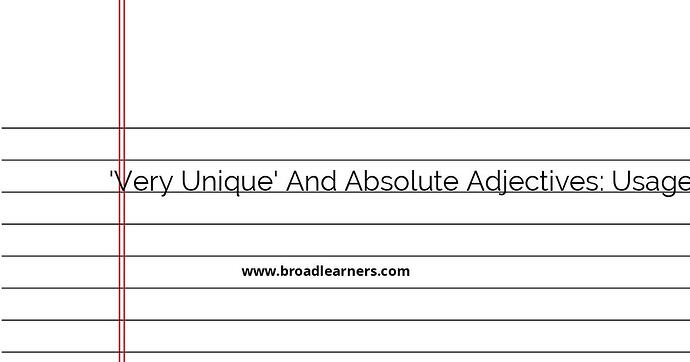The use of the term 'very unique' has sparked debates among grammarians and language enthusiasts for years. To understand this, we need to delve into the concept of absolute adjectives and how they function within the English language. This guide will clarify the correct usage of 'very unique' and provide alternatives for effective communication.
Understanding Absolute Adjectives
An absolute adjective is one that is considered as non-gradable. That means it represents a definitive attribute or condition that does not have varying degrees. Common examples of absolute adjectives include:
- Unique
- Meaning 'one of a kind' or having no equal.
- Perfect
- Indicating a state of flawlessness.
- Infinite
- Referring to something without bounds or limits.
Because these adjectives describe states that are complete or absolute, traditionally, they do not require modification with words like 'very' or 'more.'
Is 'Very Unique' Correct?
Traditionally, pairing modifiers such as 'very' with absolute adjectives has been considered incorrect or redundant because the adjective already expresses an absolute state. In proper formal writing, it is advisable to avoid using 'very unique.' Instead, seek alternatives that convey the intended emphasis without creating redundancy.
Examples and Alternatives
- Original: The artifact is very unique.
- Suggested: The artifact is extremely rare and one of a kind.
- Original: Her idea is very unique among the proposals.
- Suggested: Her idea is unparalleled among the proposals.
By using 'extremely rare,' you retain the emphasis on the artifact's distinctness without contradicting the absolute nature of 'unique.'
Choosing 'unparalleled' offers a way to describe the idea's uniqueness by emphasizing its exceptional quality.
Emphasizing Absolute Adjectives Correctly
When needing to emphasize an absolute quality, instead of using modifiers like 'very,' consider these alternatives:
- Utilize stronger diction: Use powerful adjectives that inherently include emphasis such as 'unprecedented' or 'extraordinary.'
- Add clarification or context: Provide explanation on what specifically makes the item unique or perfect.
- Use comparative or superlative forms: Though absolute adjectives generally do not take comparative forms, describing relative context can highlight their absoluteness.
Conclusion
In summary, while everyday spoken language may tolerate the use of 'very unique,' formal writing demands precision and clarity. Embracing the understanding of absolute adjectives enables one to communicate more clearly and professionally. By using context and selecting appropriate adjectives, you can successfully convey uniqueness without redundancy.
Did I miss anything? Respond below
